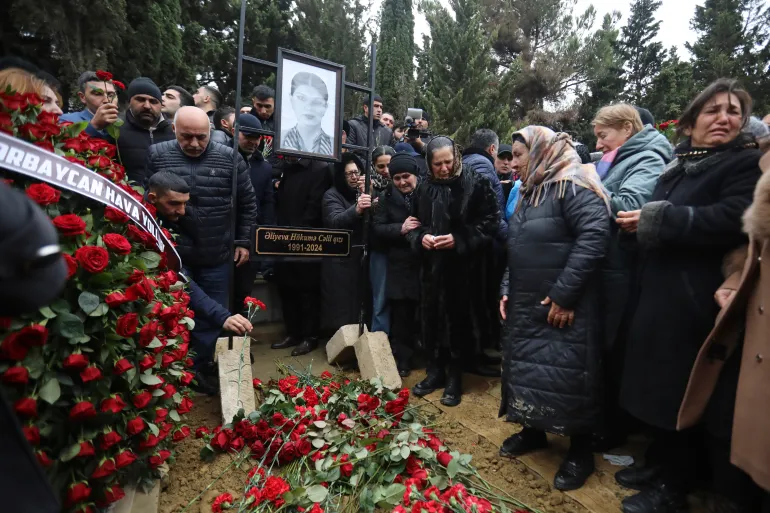With Azerbaijan in mourning this week over the Christmas Day plane crash that claimed 38 lives, political scientist Farhad Mammadov’s mind raced back to November 2020.
Then, on the last day of the war between Azerbaijan and Armenia over the Nagorno-Karabakh region, Azerbaijan shot down a Russian helicopter near its border, while it was in Armenian airspace.
“Immediately, the president of Azerbaijan called the president of Russia, took the blame for himself, for the country, brought an apology, and then there was the punishment of the guilty and the payment of compensation,” said Mammadov, who is the director of the Baku-based Center for Studies of the South Caucasus.
Four years later, the roles have reversed — almost.
On December 25, Azerbaijan Airlines Flight 8243 took off from Baku bound for Grozny in Chechnya, with 67 passengers and crew onboard. As the plane neared Grozny in Russian airspace, it appeared to have come under fire from the ground and changed course east, crashing near Aktau in western Kazakhstan. Only 29 people survived.
Advertisement
Although Russian officials at first speculated that the plane hit a flock of birds or an oxygen tank onboard exploded, the damage appeared consistent with that from surface-to-air missiles used by the Russian air defence. On Saturday, Russian President Vladimir Putin apologised for the “tragic incident” but did not directly take responsibility on Russia’s behalf, claiming Ukrainian drones were in the area.
However, Azerbaijan’s President Ilham Aliyev has demanded that Russia formally accept responsibility and pay compensation to the survivors — reflecting the anger in Azerbaijan over Moscow’s handling of the catastrophe, and the expectation that Putin be as upfront about what happened as Aliyev was in 2020.
“Azerbaijan is expecting the same now, which we have not seen yet,” said Mammadov. “And if the Russian side has chosen the path of partial apology, then we will expect subsequent apologies, punishments and compensations at the subsequent stages of the investigation into the ongoing case.”
For many in Azerbaijan, it is not just a question of what hit the plane, but how Russia responded to the emergency.
“What makes this situation even more appalling is what happened after the plane was shot down,” Leyla, a native of Baku, told Al Jazeera. “Landing permission in Russian territory was denied. This is the most gruesome part of the incident and something people cannot forgive.”
Azerbaijani officials have claimed that the pilots were denied emergency landing permission in Russia, forcing them to change course to Aktau, across the Caspian Sea.
“If the plane had been allowed to land in Russia after the mistake was realised, perhaps those lives could have been saved. Instead, the plane was sent to Kazakhstan, a decision made by heartless, incompetent individuals,” Leyla added. “This lack of humanity and accountability is what angers and devastates people the most.”
But could the fate of Flight 8243 also damage Russia’s relations with Azerbaijan?
As a former Soviet republic, relations between oil-rich Azerbaijan and its enormous northern neighbour have been complicated – but, unlike for example, the Baltics, not completely hostile.
Azerbaijan briefly gained independence following the Russian Empire’s collapse at the end of the First World War. But in 1920, the Red Army invaded, bringing Azerbaijan back under Moscow’s wing for the next seven decades.
The first few years after Azerbaijan’s independence in 1991 were marked by suspicion, as two attempted coup d’etats in Baku were backed by the Kremlin. Russia has also tried to balance friendly relations with both Azerbaijan and Armenia, with whom Azerbaijan has been in a bitter conflict over the disputed region of Nagorno-Karabakh since the late Soviet era. At the same time as selling weaponry to both sides, Moscow has tried acting as a mediator and deployed peacekeeping troops to Karabakh.
These peacekeeping troops stood back as Azerbaijani forces quickly overran Karabakh in September last year, causing almost the entire Armenian population to flee, despite Armenia being a fellow member of the Collective Security Treaty Organization (CSTO), a Russia-led NATO-like alliance. Russian peacekeepers finally withdrew from Karabakh in April this year as Baku consolidated control.
On the whole, aside from the tensions over the plane crash, ties between Russia and Azerbaijan are good, said Mammadov. Azerbaijan has not taken sides in Moscow’s war on Ukraine and is Russia’s largest trading partner in the South Caucuses, occupying a crucial transport route for goods travelling to and from Iran. Equally, Moscow matters as an economic partner for Baku.
“As a trade and economic partner [for Azerbajian], in the first place is Italy, in the second place is Turkey, and in the third place is Russia,” said political scientist and lawmaker Rasim Musabeyov.
“So, in this sense, trade and economic relations are important for Azerbaijan and Russia,” he said. “The majority of Azerbaijani planes fly to Russia, at least before this incident. The largest Russian community in the South Caucasus, about 120,000 Russians, live here.” Nearly a million Azerbaijanis live in Russia, he added.
Musabeyov believes that it is now on Putin to do the right thing to help relations get over the hit they have taken from the plane crash.
Putin’s apology, he said, “should be followed by an analysis of this incident, the culprit punished, and compensation paid”.
“Azerbaijan is not interested in worsening relations with Russia,” Musabeyov said.
















